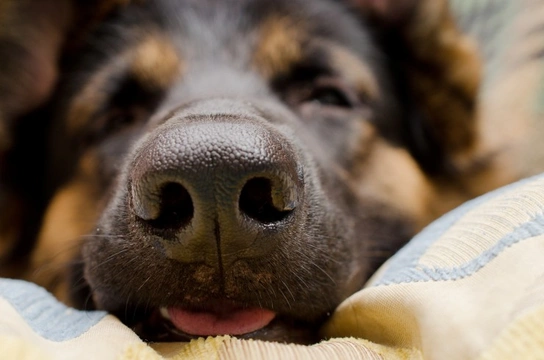
Why do dogs have wet noses?
Most dog owners are all too aware of how cold and wet dog’s noses can be, particularly if they like to remind you of their presence by pushing it into your hand or face to try to get your attention! Equally, dog owners often view a dry, warm nose as a sign of ill health, and while it is true that this is sometimes the case, it is not always indicative of a problem, and for some dogs, reflects their natural state.
If you have ever wondered why dogs tend to have wet noses, how they stay moist and what function this serves, this article is for you! Read on to learn more about why dogs have wet noses.
How the nose becomes wet
Contrary to popular belief, the nose of the dog does not produce its own external moisture from the pores, and only becomes and remains wet because the dog licks their nose, which both moistens it with saliva and also helps to distribute mucous across the nose, which helps to retain moisture levels.
Ultimately, your dog’s nose is wet because they lick it-this is why a dog that has been asleep for a while will often wake up with a dry nose. The moisture itself is simply saliva with a little mucous, and it is not snot-if your dog’s nose is snotty, or wet due to a discharge from the nostrils, this indicates a potential problem such as allergies or an infection of the respiratory tract.
Scenting ability
Dogs are of course famed for their superior scenting abilities, and the nose itself is of course the core part of this! Scents are particulate, and as well as inhaling scents through the nostrils, dogs also pick up minute scent particles on the outside of their noses as well, which can help to provide context and additional information about any given scent, as well as allowing the dog to detect scents that they might otherwise fail to pick up.
Moistening the outside of the nose helps to catch and retain some of these minute scent particles that enhance your dog’s scenting ability, and in fact dogs that have the most acute senses of smell (such as the Bloodhound) will rarely be found with a dry nose! This is because moistening the nose is such an integral element of their ability to smell so well.
Not only does moistening the nose help it to attract scent particles, but it also transfers scent information from particles on the nose into the mouth when your dog licks their nose, which are then interpreted by an additional scent gland (called Jacobson’s Organ) that is located in the roof of the mouth.
Cooling traits
As you probably already know, dogs do not keep their cool by sweating in the same way that humans do, and the only parts of the dog’s body that actually sweat (and then only a small amount) are the pads of the paws and the nose. The nose itself is of course free of fur and consists of a reasonable amount of surface area that is rich with blood vessels and capillaries, and so cooling the nose means cooling is applied to the blood circulating through it too, which then has a subtle systemic effect in cooling the whole dog down!
Licking or otherwise moistening the nose further helps to cool it down, increasing the effect again. A dog licking their nose now and then during the summer months of the year might be compared to a person using a cooling water spray on themselves when it is really hot!
Is it ok for your dog’s nose to be dry?
Many dog owners automatically assume that if their dog’s nose is dry, this indicates a problem-but in fact, your dog’s nose should never be either soaking wet (unless your dog has just plunged their nose into their water bowl of course!) nor bone dry, but somewhere in between.
As we mentioned earlier on, your dog’s nose may be dry if they have been sleeping, or for other reasons such as arid air caused by central heating systems or air conditioning. Some other more unusual causes of a really dry nose include allergies-particularly an allergy to plastics commonly used to make dog bowls, which often have no other symptoms (but make choosing a different bowl material wise nonetheless) dehydration, and illness.
If the texture of your dog’s nose is particularly lumpy, rough or otherwise appears to be abnormal or undergoing changes, this may indicate something amiss that could range from skin cancer to hormonal disorders to immune-mediated disorders, and so this requires veterinary intervention.
However, just because your dog’s nose is not glistening with moisture does not mean that something is wrong-as long as your dog is otherwise fine and this is normal for them, don’t worry!



